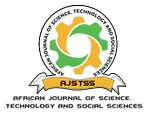A critical review on integration of virtual labs to enhance access to stem education for girls during and post Covid-19
DOI:
https://doi.org/10.58506/ajstss.v1i2.121Keywords:
STEM, Girls, Virtual Labs, e-learning, access, policyAbstract
Practical activities are extremely important in teaching sciences as they aid the students in comprehending scientific concepts through participatory learning. However, most Kenyan public schools lack well equipped laboratories. Additionally, the diminishing resources resulting from post-COVID effects offer no beam of hope. Disruption from COVID also poses critical challenges of handling physical devices in times of such pandemics. To address this, the Integration of Virtual Labs to Enhance STEM Education for Girls (IVLESTEG) project was conceptualized to enhance girl’s access to Science, Technology, Engineering and Mathematic (STEM) subjects in Kenyan secondary schools. The aim of this research study was to critically appraise the current technology models in relation to girls’ access to STEM education with the overall objective of exploring the potential of e-learning in promoting participation of female students in STEM subjects in Kenya. Upon development and implementation of learning in the V-labs, quasi experiments were conducted to determine the effectiveness of use of V-Labs in enhancing the participation of female students in STEM disciplines in secondary schools. Schools were randomly chosen and classified as either experimental or control sites. This method allowed for comparison of performance in STEM subjects of the female learners who were exposed to learning in the V-labs and those not. The findings will contribute to the development of a framework for appraising models for ICT use in STEM teaching and learning processes for girls that can inform practice, policy and research.


